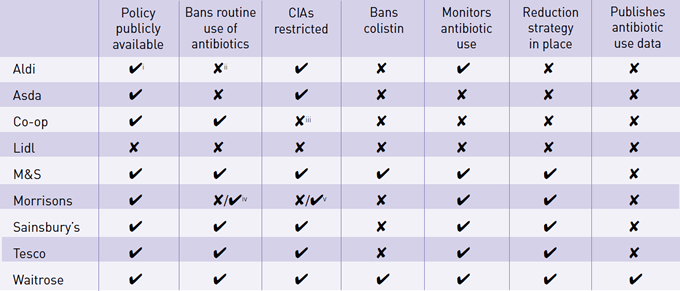A new report from the Alliance to Save Our Antibiotics shows major differences between leading UK supermarkets antibiotic policies, in the first assessment of its kind. As British livestock farmers continue to reduce their antibiotic use, the report also shows that far greater reductions are achievable in farming systems which focus on high animal health and welfare.
The assessment of supermarket policies found that five of the eight retailers - Co-op, M&S, Sainsbury’s, Tesco and Waitrose - included in the survey have now introduced welcome bans on their suppliers using antibiotics for routine disease prevention. Morrisons has a ban in some species but not in others, Aldi has some restrictions but no ban and Asda and Lidl two have no restrictions other than the minimum required by law [1].
Waitrose has the most comprehensive antibiotics policies, including limits on the use of critically important antibiotics, a ban on the use of the last-resort human antibiotic colistin, and a collection of antibiotic-use data. The next best policies were those of M&S, Sainsbury’s and Tesco. Lidl is the only supermarket included in the survey that had no publicly available antibiotic policies.
Suzi Shingler, Campaign Manager at the Alliance, said: “These findings show that some supermarkets are finally starting to take the issue of antibiotic resistance more seriously. This is very welcome and has undoubtedly contributed to the recent reductions in use. Unfortunately, our survey also shows that some supermarkets have much more to do, and others have yet to take any significant action.”
Using the latest available scientific and antibiotic-use data, the report finds that less intensive farming systems, including organic and some high-quality indoor systems, generally have much lower levels of antibiotic use. Findings also illustrate that the factors which contribute to high disease and antibiotic use vary by species.
Cóilín Nunan, scientific adviser to the Alliance, said: “We welcome recent reductions in farm antibiotic use, but much greater cuts are urgently needed if we are to preserve our remaining antibiotics. Our report shows that intensive livestock farmers have much to learn from the practices of more extensive farming systems, which often have minimal antibiotic use. Moving to later weaning of piglets, using slower-growing chickens, lowering stocking densities of animals kept indoors and keeping cattle on pasture are all essential and achievable measures which can lower antibiotic use.”
ENDS
Report findings on supermarket policies

[i] Aldi: public position on antibiotic use is available, put not the policy
[ii] Aldi: not banned, however “prophylaxis only permitted under the direct instruction of a veterinary surgeon. Producers must retain a record as to why prophylaxis was necessary, and have a management strategy on how to prevent future prophylaxis.”
[iii] Co-op: Not mentioned in the policy, but reference to “working to avoid the use of antibiotics that are important to human medicine” can be seen in a document published on the Co-op website.
[iv] Morrisons: routine use banned in chicken, egg & milk production, but not beef, pork and lamb. By 2020 all Morrisons branded fresh pork will be from pigs where routine use has been eliminated.
[v] Morrisons: Restricting the use of CIAs applies to milk, chicken and egg production, and from 2018 will include pork. Beef and lamb not covered.
Since the the publication of these findings, Lidl have published an antibiotic policy which can be found on their website. Links to all of the policies for the above supermarkets can be found here.
Report findings on farming systems broken down by species:
Pigs: Later weaning of piglets, as practiced in Sweden and in organic farming, leads to much lower antibiotic use. Rearing pigs outdoors, or in “enriched” indoor systems with lower stocking densities, can minimise disease problems leading to antibiotic use.
Broiler Chickens: Fast-growing broiler chickens, which reach slaughter age in just 32-40 days, are widely used in intensive farming and have much greater need for antibiotics than the slower-growing breeds used in free-range and organic farming and increasingly in indoor farming in the Netherlands. Lower stocking densities in indoor flocks are linked to reduced disease incidence, as air quality is better, wet litter is less of a problem and disease spread is lessened.
Dairy cows: According to the European Food Safety Authority, ”zero-grazing” dairy systems, where cows are kept indoors all year round, increase the risk of mastitis, foot problems and reproductive disorders, which are the main health problems in dairy cows leading to antibiotic use. Genetic selection for high milk yield, which has increased from 4,100 litres per cow a year in 1975 to 7,900 litres today, is also positively correlated with these conditions.
Beef Cattle: The report finds that British beef cattle, which are often farmed relatively extensively, have much lower antibiotic use than more intensively farmed cattle and veal calves in some other European countries like the Netherlands, highlighting the need to avoid moves to greater intensification.
ENDS
Notes to Editors
The Alliance to Save Our Antibiotics is an alliance of health, medical, environmental and animal welfare groups working to stop the overuse of antibiotics in animal farming. It was founded by Compassion in World Farming, the Soil Association and Sustain in 2009. Its vision is a world in which human and animal health and wellbeing are protected by food and farming systems that do not rely routinely on antibiotics and related drugs.
Press Enquiries
Cóilín Nunan, Alliance to Save our Antibiotics
coilin.nunan@phonecoop.coop
07422 556 772
Suzi Shingler, Alliance to Save our Antibiotics
sshingler@saveourantibiotics.eu
07917 585 807
Media Team, Compassion in World Farming
mediateam@ciwf.org
01483 521 886

